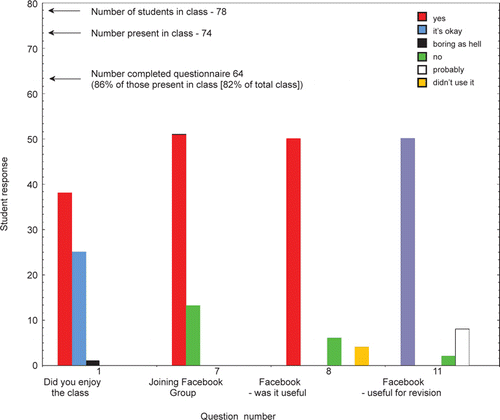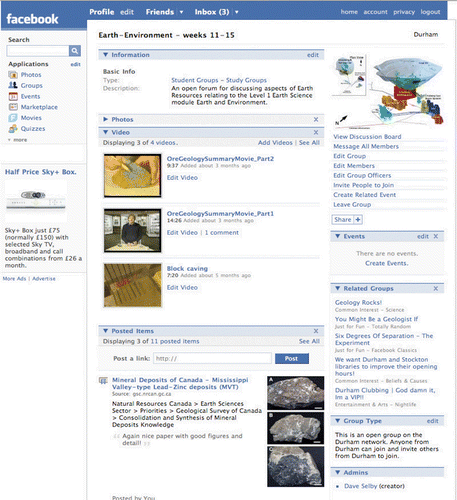Introduction
Facebook, the multi-lingual social networking site was launched in early 2004, 80 million people are now regular visitors to the site with the purpose to efficiently e-communicate with friends, family and colleagues. This communication involves sending messages (instant, wall posts and via an inbox), adding pictures or short movies. Ask any group of students if they are on “Facebook” and the reply will be an outstanding: “yes”! This response was echoed by the first year (07/08) Earth Science undergraduate cohort (n = 78) taking the “Earth and the Environment” Module at Durham University. With an almost 100% class membership to Facebook, the inevitable question is, “does Facebook have a role in the teaching of Earth Science?”. Here I report the teaching and learning findings of introducing a ‘study group’ on Facebook for the module Earth and the Environment at Durham University and discuss its merits, and possible future applications (e.g., do Facebook study groups have a place to aid the understanding of difficult subject matter, such as threshold concepts; cf. CitationMeyer and Land, 2003; Planet No. 17, 2006).
Purpose and rationale of set-up
The Earth Science undergraduate module programme at Durham University integrates, within each three-hour class, lecture-style teaching, student participation and practical studies. The overriding goal is to promote and facilitate a deep learning environment, whereby the student can take ownership of their education in and outside the classroom, i.e. student-led learning. Facebook provides a medium where the latter can be taken one step further. The networking site allows members to establish a Group, to which it can invite members. The membership can be restricted to a network (e.g. Durham University) or a class. In the Group, members can post discussions, topical items (i.e. links to the World Wide Web, [www]), videos, photos, etc.).
I created a study group called ‘Earth-Environment — weeks 11–15’, to allow an open forum for discussing aspects of Earth Resources related to the Level 1 module called Earth and the Environment (). The principal idea for developing the Facebook study group was to allow the students to further engage in aspects of the course, particularly topics that remained unclear or those that had sparked the students’ interest outside of the classroom. To facilitate discussion and further interest, I conducted a short 1 minute questionnaire (Critical Incident Questionnaires, Brookfield, 1995) at the end of each class, asking:
What was the major point/issue of today’s class?
What question comes to mind after today’s lecture?
What point/issue remains unclear?
The evening after the class, I would collate the responses to questions 2 and 3 and post the points onto the Facebook discussion board giving the students a starting point for their discussion(s). In addition to using the discussion forum for the students, I also wanted to provide the students with further resource material (e.g. www links, references, video material) to support the classroom-based teaching and learning. Presenting additional material in this way and not during the teaching slot prevented overloading the student with information and reduced the likelihood of confusion.
Outcome, use and feedback
Seventy-eight students registered for the 07/08 Earth and the Environment module, of which 60 (77%) joined the Facebook study group. Of this group 12 (20%) students actively took part in discussions and posted their own discussion topics (i.e. more than twice). The remaining 80% that joined the study group also engaged with the material posted (movies, photos, web links) and posted remarks to discussion topics. For students that did not join or engage with the study group, the material was still made available through classroom handouts.
An example of the student engagement with the Facebook study group is given below. Following a classroom 1 minute questionnaire I posted a discussion topic, “Knowledge of ore deposits”, with the accompanying message,
“Somebody asked in the questionnaire - are we still learning about ore deposits and how likely is it different deposits will be found? What do you think?”
I quote some of the student responses below.
“i think we are still learning about ore deposits - and i also think there’s a chance of finding new deposits - we haven’t found all the chemicals to fill the periodic table and so there is still a chance we can find more deposits. anyone else?”
“I agree. Personally I believe that anywhere in the field of Earth Sciences new things are being discovered all the time, and this applies here too. We can’t say with full certainty that we already know everything about ore deposits or where they are in the world. However, as we are learning more about them all the time we may find it easier to make educated guesses as to where new deposits are or are likely to be in the future - therefore it could be said that the likelihood of us finding new deposits is increasing. Even so, I don’t think you can put a value on the likelihood of new deposits being found.”
“i agree in that i think that it is impossible to say that we have definitively discovered all available deposits of ores in the world, be they resources or reserves at present time. for example i was reading that there is over 100 billion tonnes of pure gold in the earths oceans at present time, which may become a key economic resource as and when we can find methods to isolate and find concentrated examples of gold in the oceans as is being done at present with diamonds, where deposits of kimberlite have been eroded away on the sea bed, leaving behind caches of raw diamonds which can easily be collected by companies with the appropriate technology i.e suction tubes etc”
Another discussion topic example was, “Volcanism and mineral deposits, are they associated?” The quoted responses were:
“From what I have seen just from a few minutes research, volcanism and mineral deposits are very closely related. For example kimberlite that brings up diamonds from the mantle is thrust up via volcanism, gold is found in porphyry deposits under subduction zones too. Ash from Mt Vesuvius and Mt St Helens has laid host to gold, silver and copper deposits. Would like to find more detailed research if anyone knows any good websites?”
“http://vulcan.wr.usgs.gov/LivingWith/ PlusSide/mineral_resources.html Seems to be a good overview with a few good examples.
Good article http://www.sciencemag.org/cgi/content/full/314/5797/263 Probably loads out there all giving contrasting views depending on their outlook (financial backing) and the most up to date info might not always be available.”
These responses demonstrate that some of the students are engaging in their learning and are comfortable in allowing their ideas to be read and commented on by their peers. The last quoted example is particularly exciting because a first year student using their initiative has identified and read a journal article, in this case, from the journal Science.
To note, it could be said that there is a danger of students posting misconceptions / wrong ideas. However, by keeping track of the study group it is easy to moderate the posted discussion(s). If necessary, a comment can be added to keep the students on the right path, but not dampen ideas or hinder free thought. The latter was not necessary in the case of this study group.
At the end of the module I provided the students with an additional questionnaire to obtain feedback regarding how the students had received the idea of using Facebook as an education support tool. The results from this questionnaire highlighted that even though 80% of the Facebook study group had been active in posting discussion topics or comments, the students had found the study group extremely useful (). Several student quotes on what they found useful about the Facebook study group are given below.
“being able to discuss things I didn’t understand and sharing useful websites.”
“Provided good additional reading source — less dry than books!”
“The links were good and it was interesting to see other peoples ideas on the discussion boards.”
“I found being able to ask questions out of the lecture time and get multiple answers from you and my peers very useful.”
“extra articles show that what we are learning is used in industry. Easy and informal way of contacting peers/lecturer and raising issues if there was a need.”
“Enjoyed reading the extra articles. It gave relevance to the course that are a big issue in many places.”
’Another chance to ask questions. Allows and develops further thought.”
’The posts about Scottish gold and Canadian resources.”
“Reading the comments posted and articles.”
“Very good links/ideas/articles and useful discussions.”
Eighty-two percent of the class completed the end of module questionnaire. Of these, only 12% stated that they hadn’t found the site useful, however no reasoning was given why. Eight percent said they did not use the study group. One student stated,
“Social networking sites = breakdown of societies ability to interact in real life situations.”
Figure 2 Results of a questionnaire completed by 82% of the students on the module. Questions presented relate to the students perceptions of the class and response to use of the Facebook study group. 1. Have you enjoyed this part of the course? Yes, overall pretty good, It’s Okay, Boring as hell; 7. Did you join the Facebook Group?; 8. Was the Facebook Group useful?; 11. Do you think it will be useful for revision?

The students were also asked if they would use the study group for revision. Seventy-eight percent stated: yes. Although no discussions were posted during the revision and exam period, students may have accessed the site to view video footage that summarized the module material and to follow www links. An additional post-exam questionnaire would be required to fully evaluate this. However, 49 responded to a message through the Facebook study group that they had used the site during their revision. One student responded in saying,
“I did use this group for revision and it was really helpful - especially those videos, I watched them several times to try and get them to sink in and it seems to have helped me a lot. That’s definitely something I reckon you should do for future groups - not so sure about the copyright implications though.”
Discussion and future plans
Herein the presented information shows that from my first attempt at using a Facebook study group through posting additional material (e.g. videos, worked ideas, reading material, www links, etc.) could be central to allowing students to grasp particularly difficult ideas and further enhance their learning. Customizing online learning (Salmon, 2002), even through Facebook, could aid in breaking down threshold concepts.
In any subject, there are topics and concepts that students often find difficult to grasp, which are often central to the forthcoming material. The latter have been described as ‘threshold’ concepts or topics (cf. CitationMeyer and Land, 2003; Planet No. 17, 2006). Such study groups as described could be central to allowing students to grasp these particularly difficult ideas and further enhance their learning.
Although here I present the initial use and feedback of a Facebook study group from an Earth Science perspective, a similar approach can of course be used for any subject area. Recent papers, research symposiums and conferences involving several cross disciplines (sociology, media, communication and cultural studies, information science, education, politics, psychology, geography and internet research) are addressing Facebook as a network and research tool. The latter are also exploring issues of trust, deception and negotiation of identity with the use of Facebook for student support and learning (cf. Poke 1.0 - a Facebook social research symposium 2007; Facebook: a network, a research tool, a world? 2008; CitationEllaway, 2007; Mitchell and Watstein, 2007; Mazer et al., 2007).
What’s next for the future? I plan to continually develop using Facebook study groups for my teaching in Earth Science to further allow students to interact and engage in their learning. In the first instance, a study group will be set up for the same module next year with greater focus on practical aspects (e.g. microscope work). In addition, new groups will be created for other modules. For example, the plan is to trial the use of Facebook for modules involving fieldwork, to provide further connection between field studies and lecture-based modules. As noted by CitationMitchell and Watstein (2007), there are endless possibilities for using Facebook as an e-learning educational support tool. Watch this space!
Acknowledgements
Many thanks are due to Paula Martin, Jonny Imber and Stuart Jones for their comments on this work.
Poke 1.0 - a Facebook social research symposium London Knowledge Lab, University of London, 15th November 2007.
Facebook: a network, a research tool, a world? Liverpool John Moores University 24th October 2008.
References
- BrookfieldS.D. (1995) Becoming a critically reflective teacher: Jossey-Bass, San Francisco, 287p.
- EllawayR., (2007) eMedical Teacher, Medical Teacher 29: 849-850.
- MazerJ.P., MurphyR.E. and SimondsC.J. (2007) I’ll see you on “Facebook: The effects of computer-mediated teacher self-disclosure on student motivation, affective learning, and classroom climate, Communication Education 56: 1-17.
- MeyerJ.H.F. and LandR. (2003) Threshold concepts and troublesome knowledge (I): linkages to ways of thinking and practicing, in RustC. (ed), Improving student Learning — ten years on. Oxford: OCSLD.
- MitchellE. and WatsteinS. B. (2007) The places where students and scholars work, collaborate, share and plan, Reference Services Review 35: 521-524.

